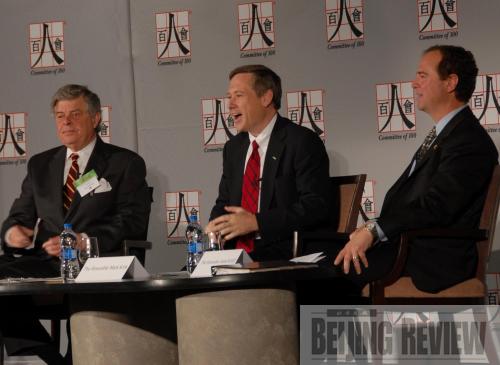|
 |
|
BUILDING SINO-U.S. TIES: Former U.S. Ambassador to China James R. Sasser (left), Representative Mark Kirk (center) and Representative Adam Schiff participate in the Committee of 100's annual conference on May 1 in Washington, D.C. (CHEN WEN) |
When members and guests of the Committee of 100, a well-known non-political organization comprised of prominent Chinese-Americans of various professions, convened in Washington, D.C. for their 18th annual conference from April 30 to May 2, right after U.S. President Barack Obama marked his first 100 days in office, the hottest issue they discussed was the Obama administration's policy toward China and how the two countries can work together to deal with the current economic chaos.
In his first 100 days, President Obama was occupied with addressing major world problems including the economic and financial crisis, climate change, North Korea's nuclear program and energy security. "None of these problems can be addressed successfully without the active and sustained participation of China," Jeffrey Bader, Special Assistant to President Obama and Senior Director for Asian Affairs at the National Security Council, told conference participants on May 1.
The Obama administration is not the first to recognize the importance of involving China in international affairs, Bader said. But the difference now is, China's growth and rise in the last decade has increased its potential role in solving these problems. "President Obama understands this and is not conflicted about seeking China's involvement," Bader said.
The president's personal style of diplomacy, Bader observed, is "pragmatic." He said that the president has ideals but not ideology, and sees China as a "major global player" but not "an inevitable threat."
Obama, being pragmatic, appointed three Chinese Americans to Cabinet positions: Chris Lu as cabinet secretary, Nobel Prize-winning physicist Steven Chu as secretary of energy and Gary Locke, the nation's first Chinese-American governor, as secretary of commerce.
As the economic crisis and climate change move to the center of China-U.S. relations, Chu and Locke, to some extent, elevate the prospect of bilateral cooperation on these two pressing issues.
Bader said that past administrations have run into issues that complicated the relationship between China and the United States, such as human rights, bilateral trade, and military and cross-Straits relations. He pointed out that "finger-pointing," "lecturing" or "hectoring" is not the right way to solve these issues. The president "is looking forward to reaching out to the Chinese audience and connecting with them," he said.
|
